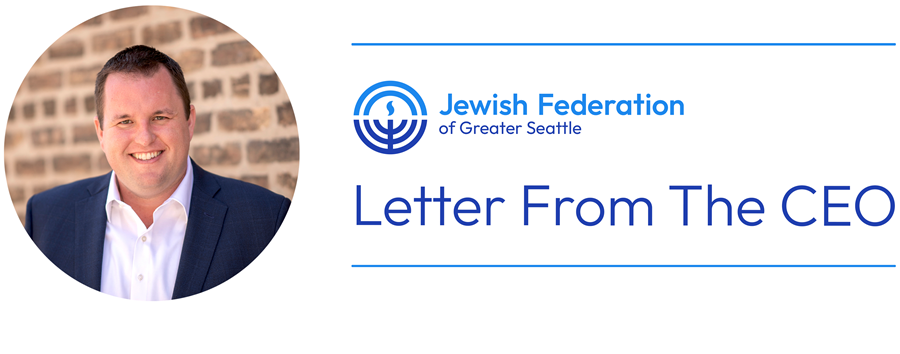
April 19, 2024
By Solly Kane, President & CEO
This coming week, we celebrate Passover. As we gather with family and friends around the seder table, many themes of the holiday have taken on a new meaning in the post October 7 world. While we retell the story of our liberation from bondage, there are still over 100 hostages who remain in Gaza, in a bondage that we cannot fully comprehend. As we gather together next week around the Passover Seder table, I hope that the biblical phrase to “let my people go” can be a modern cry to finally free the hostages.
Passover Seders are supposed to be gatherings where we retell, discuss, wrestle, and strive to understand how the Exodus story applies today. These conversations have the potential to be particularly complicated this year and I’ve heard from many community members worried about how (and how much) should the seder reflect the post 10/7 world, how does it not become a night solely about Israel and the war with Hamas, and how do we embrace our family and friends and the holiday even, and perhaps especially, while there is a diversity of opinions around our tables and in our community.
In addition to Passover around the corner, earlier this week, the ADL released their 2023 Audit of Antisemitic Incidents. Unsurprisingly, the data shows the highest number of recorded incidents in the United States since the ADL began tracking antisemitic incidents 45 years ago – much of the increase coming in the post October 7 period.
At the seder, I always appreciate the story of, and lessons from, the four sons (or children). In the Passover Seder, the four children give us the opportunity to reflect on four perspectives. My wife and I recently welcomed our first son, and as a result, this year thinking about the four children feels just a bit more personal to me.
I wondered what the four children from the Passover Seder would ask, say, and need if they were in our world today faced with the unchecked increase in antisemitism:
The Wise Child might ask “What is the history of antisemitism and why does it still exist today?” to which we might share about all that our people have overcome throughout history, and about the work we are engaged in today to ensure a strong Jewish future. We tell this child truthfully, and age appropriately, about the complexities of the current world – and how we can be both strong supporters of Israel and simultaneously feel deep pain for the loss of all innocent lives and human suffering anywhere.
I think the Wicked Child might ask “If things are difficult, why can’t we just pretend we are not Jewish?” to which we might answer that when there are challenges like those we face in the world, it is all the more important to not separate oneself from the community. And, we might remind the child that some people don’t have the ability or option to hide and so we must not abandon them. Much has been written about whether the wicked child is truly wicked and I would offer that with this question – though self-centered at face value – at its core it speaks to the fear that so many of us have felt in recent months.
I imagine the Simple Child might ask “Why do people seem to hate us?” to which we might respond that while it is a scary time to be Jewish, there are also still people of good conscience who are willing to speak up for us and we believe that just as God led us out of Egypt with a mighty hand, so too will we get through this difficult time.
For the child who does not know how to ask, it may just be enough to offer a hug and the embrace of being a part of a community.
As we conclude our seder with the words “next year in Jerusalem”, may we simultaneously remember past and present suffering and hold onto hope for a better tomorrow.
Shabbat Shalom and Chag Sameach,

The Jewish Federation of Greater Seattle is a 501(c)(3) non-profit organization.
Copyright © 2024 Jewish Federation of Greater Seattle. All rights reserved.